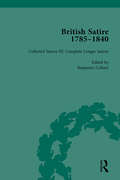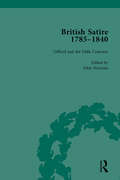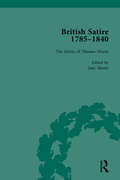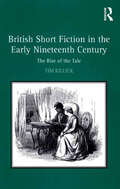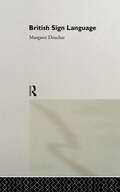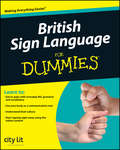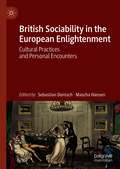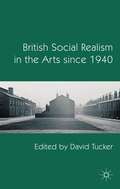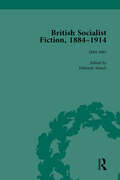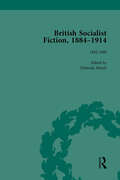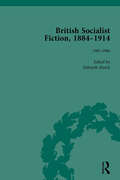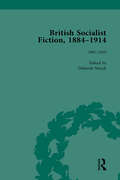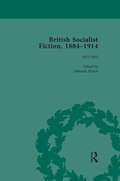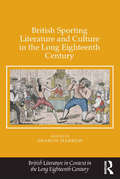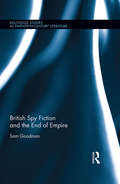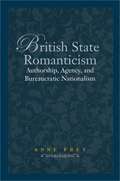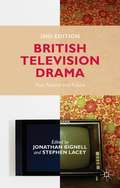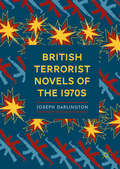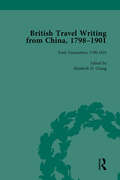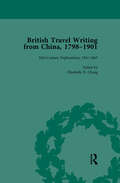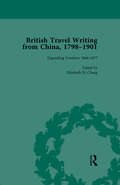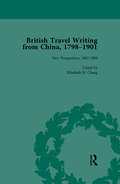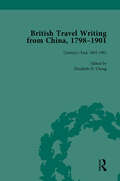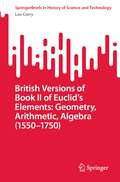- Table View
- List View
British Satire, 1785-1840, Volume 3
by John Strachan Steven E JonesThis set offers a representitive collection of the verse satire of the Romantic period, published between the mid-1780s and the mid-1830s. As well as two single-author volumes, from William Gifford and Thomas Moore, there is also a wealth of rare, unedited material.
British Satire, 1785-1840, Volume 4
by John Strachan Steven E JonesThis set offers a representitive collection of the verse satire of the Romantic period, published between the mid-1780s and the mid-1830s. As well as two single-author volumes, from William Gifford and Thomas Moore, there is also a wealth of rare, unedited material.
British Satire, 1785-1840, Volume 5
by Jane MooreThis set offers a representitive collection of the verse satire of the Romantic period, published between the mid-1780s and the mid-1830s. As well as two single-author volumes, from William Gifford and Thomas Moore, there is also a wealth of rare, unedited material.
British Short Fiction in the Early Nineteenth Century: The Rise of the Tale
by Tim KillickIn spite of the importance of the idea of the 'tale' within Romantic-era literature, short fiction of the period has received little attention from critics. Contextualizing British short fiction within the broader framework of early nineteenth-century print culture, Tim Killick argues that authors and publishers sought to present short fiction in book-length volumes as a way of competing with the novel as a legitimate and prestigious genre. Beginning with an overview of the development of short fiction through the late eighteenth century and analysis of the publishing conditions for the genre, including its appearance in magazines and annuals, Killick shows how Washington Irving's hugely popular collections set the stage for British writers. Subsequent chapters consider the stories and sketches of writers as diverse as Mary Russell Mitford and James Hogg, as well as didactic short fiction by authors such as Hannah More, Maria Edgeworth, and Amelia Opie. His book makes a convincing case for the evolution of short fiction into a self-conscious, intentionally modern form, with its own techniques and imperatives, separate from those of the novel.
British Sign Language
by Margaret DeucharThis first linguistic study of British Sign Language is written for students of linguistics, for deaf and hearing sign language researchers, for teachers and social workers for the deaf. The author cross-refers to American Sign Language, which has usually been more extensively studied by linguists, and compares the two languages.
British Sign Language For Dummies
by City LitLearn British Sign Language quickly and easily with this essential guide and CD-RomThis lively guide introduces the key hand shapes and gestures you need to communicate in British Sign Language. The illustrations depict both the actions and facial expressions used to sign accurately, while the companion CD-Rom features real-life BSL conversations in action to further your understanding. With these practical tools, you'll become an expert signer in no time!British Sign Language For Dummies includes:Starting to sign - learn about Deaf communication and practise simple signs to get you goingLearning everyday BSL - develop the grammar and vocabulary skills that are the building blocks to using British Sign LanguageGetting out and about - sign with confidence in a wide range of real-life situations, from travelling to datingLooking into Deaf life - learn about the history of the Deaf Community and how they've adapted their technology and lifestyles to suit their needsFor corrections to this book, please click here:http://www.wiley.com/legacy/wileyblackwell/BSLcorrectionslip.pdfNote: CD files are available to download when buying the eBook version
British Sign Language For Dummies
by City LitLearn British Sign Language quickly and easily with this essential guide and CD-Rom This lively guide introduces the key hand shapes and gestures you need to communicate in British Sign Language. The illustrations depict both the actions and facial expressions used to sign accurately, while the companion CD-Rom features real-life BSL conversations in action to further your understanding. With these practical tools, you’ll become an expert signer in no time! British Sign Language For Dummies includes: Starting to sign – learn about Deaf communication and practise simple signs to get you going Learning everyday BSL – develop the grammar and vocabulary skills that are the building blocks to using British Sign Language Getting out and about – sign with confidence in a wide range of real-life situations, from travelling to dating Looking into Deaf life – learn about the history of the Deaf Community and how they’ve adapted their technology and lifestyles to suit their needs For corrections to this book, please click here: http://www.wiley.com/legacy/wileyblackwell/BSLcorrectionslip.pdf Note: CD files are available to download when buying the eBook version
British Sociability in the European Enlightenment: Cultural Practices and Personal Encounters
by Sebastian Domsch Mascha HansenThis volume covers a broad range of everyday private and public, touristic, commercial and fictional encounters between Britons and continental Europeans, in a variety of situations and places: moments that led to a meaningful exchange of opinions, practices, or concepts such as friendship or politeness. It argues that, taken together, travel accounts, commercial advice, letters, novels and philosophical works of the long eighteenth century, reveal the growing impact of British sociability on the sociable practices on the continent, and correspondingly, the convivial turn of the Enlightenment. In particular, the essays collected here discuss the ways and means – in conversations, through travel guides or literary works – by which readers and writers grappled with their cultural differences in the field of sociability. The first part deals with travellers, the second section with the spreading of various cultural practices, and the third with fictional encounters in philosophical dialogues and novels.
British Social Realism in the Arts since 1940
by David TuckerThis is the first book of its kind to look across disciplines at this vital aspect of British art, literature and culture. It brings the various intertwined histories of social realism into historical perspective, and argues that this sometimes marginalized genre is still an important reference point for creativity in Britain.
British Socialist Fiction, 1884-1914, Volume 1
by Deborah MutchSocialism in late Victorian and Edwardian Britain was a highly literate movement. Every socialist group produced some form of written text through which their particular brand of politics could be promoted. This edition collects serialized fiction and short stories that have not been published since their original appearance.
British Socialist Fiction, 1884-1914, Volume 2
by Deborah MutchSocialism in late Victorian and Edwardian Britain was a highly literate movement. Every socialist group produced some form of written text through which their particular brand of politics could be promoted. This edition collects serialized fiction and short stories that have not been published since their original appearance.
British Socialist Fiction, 1884-1914, Volume 3
by Deborah MutchSocialism in late Victorian and Edwardian Britain was a highly literate movement. Every socialist group produced some form of written text through which their particular brand of politics could be promoted. This edition collects serialized fiction and short stories that have not been published since their original appearance.
British Socialist Fiction, 1884-1914, Volume 4
by Deborah MutchSocialism in late Victorian and Edwardian Britain was a highly literate movement. Every socialist group produced some form of written text through which their particular brand of politics could be promoted. This edition collects serialized fiction and short stories that have not been published since their original appearance.
British Socialist Fiction, 1884-1914, Volume 5
by Deborah MutchSocialism in late Victorian and Edwardian Britain was a highly literate movement. Every socialist group produced some form of written text through which their particular brand of politics could be promoted. This edition collects serialized fiction and short stories that have not been published since their original appearance.
British Sporting Literature and Culture in the Long Eighteenth Century (British Literature in Context in the Long Eighteenth Century)
by Sharon HarrowSport as it is largely understood today was invented during the long eighteenth century when the modern rules of sport were codified; sport emerged as a business, a spectacle, and a performance; and gaming organized itself around sporting culture. Examining the underexplored intersection of sport, literature, and culture, this collection situates sport within multiple contexts, including religion, labor, leisure time, politics, nationalism, gender, play, and science. A poetics, literature, and culture of sport swelled during the era, influencing artists such as John Collett and writers including Lord Byron, Jonathan Swift, and Henry Fielding. This volume brings together literary scholars and historians of sport to demonstrate the ubiquity of sport to eighteenth-century life, the variety of literary and cultural representations of sporting experiences, and the evolution of sport from rural pastimes to organized, regular events of national and international importance. Each essay offers in-depth readings of both material practices and representations of sport as they relate to, among other subjects, recreational sports, the Cotswold games, clothing, women archers, tennis, celebrity athletes, and the theatricality of boxing. Taken together, the essays in this collection offer valuable multiple perspectives on reading sport during the century when sport became modern.
British Spy Fiction and the End of Empire (Routledge Studies in Twentieth-Century Literature)
by Sam GoodmanThe position of spy fiction is largely synonymous in popular culture with ideas of patriotism and national security, with the spy himself indicative of the defence of British interests and the preservation of British power around the globe. This book reveals a more complicated side to these assumptions than typically perceived, arguing that the representation of space and power within spy fiction is more complex than commonly assumed. Instead of the British spy tirelessly maintaining the integrity of Empire, this volume illustrates how spy fiction contains disunities and disjunctions in its representation of space, and the relationship between the individual and the state in an era of declining British power. Focusing primarily on the work of Graham Greene, Ian Fleming, Len Deighton, and John le Carre, the volume brings a fresh methodological approach to the study of spy fiction and Cold War culture. It presents close textual analysis within a framework of spatial and sovereign theory as a means of examining the cultural impact of decolonization and the shifting geopolitics of the Cold War. Adopting a thematic approach to the analysis of space in spy fiction, the text explores the reciprocal process by which contextual history intersects with literature throughout the period in question, arguing that spy fiction is responsible for reflecting, strengthening and, in some cases, precipitating cultural anxieties over decolonization and the end of Empire. This study promises to be a welcome addition to the developing field of spy fiction criticism and popular culture studies. Both engaging and original in its approach, it will be important reading for students and academics engaged in the study of Cold War culture, popular literature, and the changing state of British identity over the course of the latter twentieth century.
British State Romanticism
by Anne FreyRomantic period authors are stereotyped as imaginative geniuses working in isolation from politics. In a rethinking of 19th century British Romantic fiction, Frey (English, Texas Christian U. ) argues that the writings of Samuel Taylor Coleridge, William Wordsworth, Walter Scott, Jane Austen, and Thomas De Quincey were not immune from being influenced by the increasing centralization of state power and bureaucratized cultural economy. Drawing on Foucault's model of the pastoral state, she contends that this "State Romanticism" movement offered an aesthetic model in which authors served as both creators and agents of this type of power structure. As in Austen's Persuasion, the state (via the navy in this case) is regarded as a means to shape individual and national character. Annotation ©2010 Book News, Inc. , Portland, OR (booknews. com)
British Television Drama: Past, Present And Future
by Jonathan Bignell Stephen LaceyFeaturing leading scholars of British television drama and noted writers and producers from the television industry, this new edition of British Television Drama evaluates past and present TV fiction since the 1960s, and considers its likely future.
British Terrorist Novels of the 1970s
by Joseph DarlingtonThis book discusses British novels published during the 1970s which feature terrorists either as main characters or a major plot points. The focus on terrorism’s literary depiction provides insight into the politics of the decade. The book analyses texts from Gerald Seymour, Anthony Burgess, V.S. Naipaul, Graham Greene, Doris Lessing, B.S. Johnson, Tom Sharpe, and Eric Ambler, among others, in order to engage with the IRA, the end of Empire, counterculture and environmentalism. The book provides a brief history of terrorism as a concept and tactic before discussing British literature’s relationship with terrorism. It presents a “standard terrorist morphology” by which to analyse terrorist narratives along with other insights into the British post-war imagination, writing and extremism.
British Travel Writing from China, 1798-1901, Volume 1
by Elizabeth H ChangIn 1793, Lord Macartney led the first British diplomatic mission to China in over one hundred years. This five-volume reset edition draws together British travel writings about China throughout the next century. The collection ends with the Boxer Uprising which marked the beginning of the end of informal British empire on the Chinese mainland.
British Travel Writing from China, 1798-1901, Volume 2
by Elizabeth H ChangIn 1793, Lord Macartney led the first British diplomatic mission to China in over one hundred years. This five-volume reset edition draws together British travel writings about China throughout the next century. The collection ends with the Boxer Uprising which marked the beginning of the end of informal British empire on the Chinese mainland.
British Travel Writing from China, 1798-1901, Volume 3
by Elizabeth H ChangIn 1793, Lord Macartney led the first British diplomatic mission to China in over one hundred years. This five-volume reset edition draws together British travel writings about China throughout the next century. The collection ends with the Boxer Uprising which marked the beginning of the end of informal British empire on the Chinese mainland.
British Travel Writing from China, 1798-1901, Volume 4
by Elizabeth H ChangIn 1793, Lord Macartney led the first British diplomatic mission to China in over one hundred years. This five-volume reset edition draws together British travel writings about China throughout the next century. The collection ends with the Boxer Uprising which marked the beginning of the end of informal British empire on the Chinese mainland.
British Travel Writing from China, 1798-1901, Volume 5
by Elizabeth H ChangIn 1793, Lord Macartney led the first British diplomatic mission to China in over one hundred years. This five-volume reset edition draws together British travel writings about China throughout the next century. The collection ends with the Boxer Uprising which marked the beginning of the end of informal British empire on the Chinese mainland.
British Versions of Book II of Euclid’s Elements: Geometry, Arithmetic, Algebra (SpringerBriefs in History of Science and Technology)
by Leo CorryThis book discusses the changing conceptions about the relationship between geometry and arithmetic within the Euclidean tradition that developed in the British context of the sixteenth and seventeenth century. Its focus is on Book II of the Elements and the ways in which algebraic symbolism and methods, especially as recently introduced by François Viète and his followers, took center stage as mediators between the two realms, and thus offered new avenues to work out that relationship in idiosyncratic ways not found in earlier editions of the Euclidean text. Texts examined include Robert Recorde's Pathway to Knowledge (1551), Henry Billingsley’s first English translation of the Elements (1570), Clavis Mathematicae by William Oughtred and Artis Analyticae Praxis by Thomas Harriot (both published in 1631), Isaac Barrow’s versions of the Elements (1660), and John Wallis Treatise of Algebra (1685), and the English translations of Claude Dechales’ French Euclidean Elements (1685). This book offers a completely new perspective of the topic and analyzes mostly unexplored material. It will be of interest to historians of mathematics, mathematicians with an interest in history and historians of renaissance science in general.
